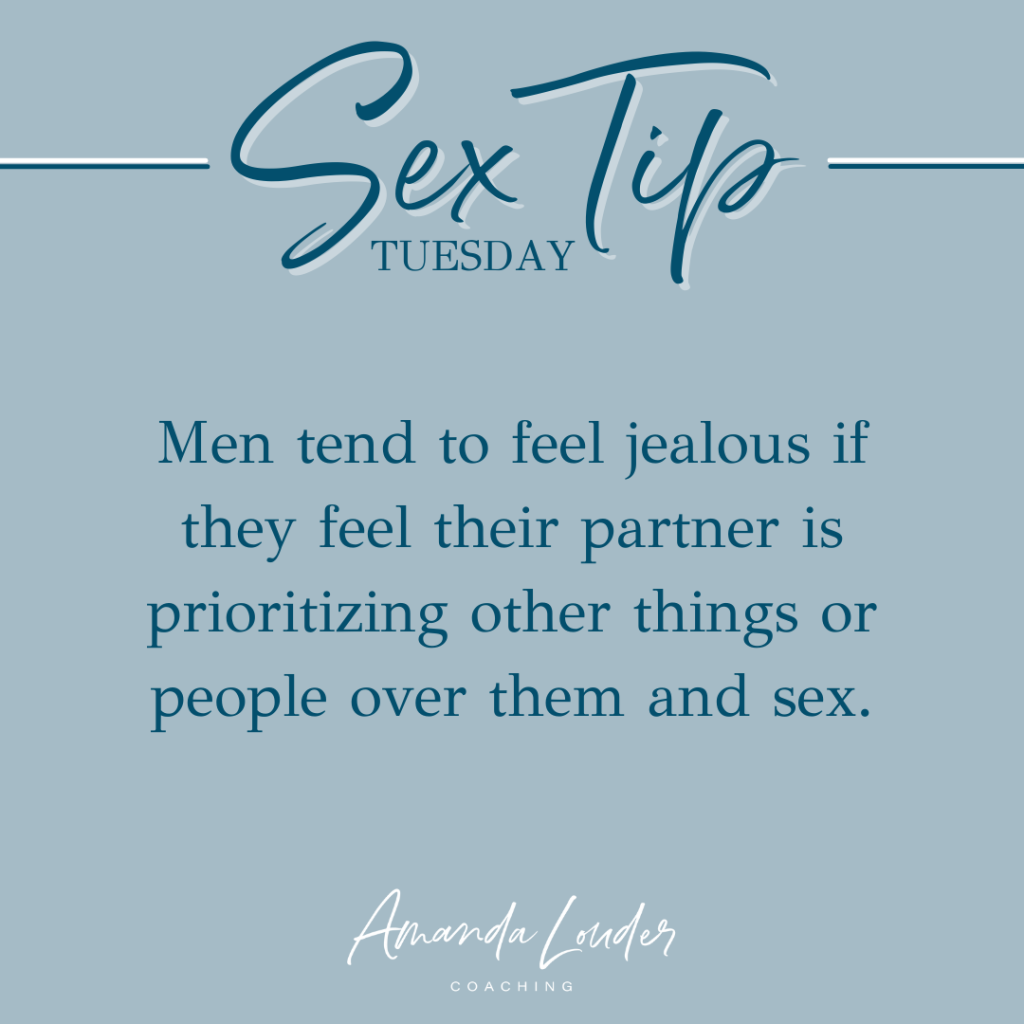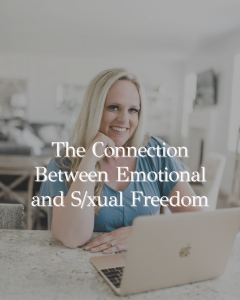
Have you ever been jealous in your relationship? Around 77% of people report feeling at least an occasional jealousy in their relationships. In this episode, we’re talking about jealousy and how a little jealousy in a relationship can be a good thing, but too much jealousy can damage a relationship. Let’s discuss why you’re feeling jealous and what you can do about it.
Show Notes:
Follow Amanda on Facebook and Instagram.
Join Amanda’s Private Facebook Group.
References for this episode:
Show Summary:
Have you ever been jealous in your relationship? According to a study in the Journal of Social and Personal Relationships, around 77% of respondents reported feeling at least occasional jealousy in their romantic relationships. However, the intensity and frequency of jealousy can vary widely from couple to couple, and some couples may not experience jealousy at all.
What is jealousy? We often think of it as an emotion, but according to Brené Brown in her book Atlas of the Heart, “Jealousy is “a cognitive evaluation in response to feeling anger, sadness, and/or fear. In other words, we think jealousy is a response to how we feel.” And I would say, in addition to anger, sadness, and/or fear, it’s also common to feel suspicious and insecure, and we will talk more about that later.
“According to researchers Mingi Chung and Christine Harris, jealousy typically involves a triad – two people in a relationship and a rival; the rival is usually another person, but occasionally it is letting something else, such as a loss of valuable relationship time to a favored activity. They write “The core form of jealousy primarily involves threats to relationship rewards including loss of a loved one’s attention, affection, or resources to another.”
Many times as men and women, we feel jealous in our marriage. Jealousy can be triggered by perceived threats to the relationship, feelings of inadequacy or insecurity, or past experiences of betrayal or infidelity. Jealousy isn’t always a bad thing. Too much is a problem and not enough can also be a problem. While it’s natural to feel a certain level of possessiveness over your partner, excessive or unfounded jealousy can cause tension, mistrust, a breakdown of communication and damage in the relationship. Jealousy can lead to controlling behavior and a constant questioning of one’s partner. It can also create a negative cycle where the jealous partner becomes increasingly suspicious and the other partner becomes more distant as a result. On the flip side, if you are noticing your partner putting their attentions elsewhere, and you don’t care at all about that, that may indicate some apathy on your part. You might not be caring enough.
A question I recently got from a listener was “how do I know if my jealousy is my intuition kicking in, that there is actually something wrong versus me just feeling insecure?” And that is a really great question. Distinguishing between intuition and insecurity can be a challenge as both can produce feelings of anxiety, suspicion, and mistrust. However, there are some ways to determine whether your jealousy is based on intuition or insecurity.
- Consider the evidence: If you are feeling jealous, try to objectively evaluate the evidence that is causing your jealousy. Are there concrete facts or behaviors that support your suspicion, or is it based on vague feelings or assumptions? If there is clear evidence of something amiss, it may be a case of intuition. However, if there is no concrete evidence and your jealousy is based on vague or irrational fears, it may be more likely to be insecurity.
- Examine your past experiences: Your past experiences can shape your perception of your current situation. If you have experienced betrayal or infidelity in the past, it may be more likely to trigger feelings of jealousy, even if your current partner has done nothing wrong. In this case, your jealousy may be based on past insecurities rather than on intuition.
- Check in with yourself: If you are feeling jealous, take a moment to check in with yourself and explore the underlying emotions that are driving your jealousy. Are you feeling neglected or unsupported in your relationship, or are you feeling insecure about your own self-worth? Understanding the underlying emotions can help you determine whether your jealousy is based on intuition or insecurity.
Ultimately, determining whether your jealousy is based on intuition or insecurity requires a combination of self-awareness, communication with your partner, and a willingness to examine your own thoughts and feelings. This is one of the tools I teach you in my coaching programs. Self-awareness is key here.
What if you are the partner of the one who is jealous? What is the best way to deal with that? Ultimately, you want to help address the issue and build a stronger, more trusting relationship. So here are some tips:
- Validate their feelings: It is important to acknowledge your spouse’s feelings of jealousy and let them know that you understand where they are coming from, even if their reasons are unfounded. This can help them feel heard and may make it easier for them to open up and communicate with you. Often feelings of jealousy are actually a bid for attention.
- Communicate openly and honestly: Talk to your spouse about their specific concerns and try to understand what is triggering their feelings of jealousy. Be honest and transparent about your own feelings and actions, and work together to find solutions that address both of your needs.
- Build trust: Trust is essential in any relationship, and it is especially important when dealing with jealousy. Take steps to build trust in your relationship, such as being reliable, open, and transparent, keeping your promises, and demonstrating your commitment to your spouse.
- Avoid behaviors that may trigger jealousy: Be mindful of your actions and avoid behaviors that may trigger your spouse’s feelings of jealousy. This may include avoiding contact with ex-partners, being mindful of your interactions with others, and being transparent about your plans and activities. While you can’t control how your partner feels, by being a person of integrity, you can influence their belief patterns and feelings.
- Seek professional help: If jealousy is causing significant problems in your relationship, it may be helpful to seek professional help from a therapist or coach. A trained professional can provide guidance and support to help you work through issues related to jealousy and build a stronger, more fulfilling relationship.
In my work, I have noticed some patterns of jealousy.
- Women tend to be more jealous of other women. Maybe they perceive that their partner is receiving a lot of attention from other women or they feel like they are in competition with other women for their partner’s affection.
- Women are more likely to feel jealous if their partner is emotionally invested in someone else, such as a close friend or coworker, even if there is no physical intimacy.
- Women may feel jealous if they feel like their partner is not making an effort to communicate or connect with them emotionally or spend time with them outside of sex.
- Women may feel jealous if they feel like they are not measuring up to their partner’s expectations or if they perceive that their partner is comparing them to other women.
On the other hand
- Men may feel jealous if they feel neglected or unsupported in their relationship, especially if they feel like their partner is prioritizing other things or people over them. I find this especially true with sex.
- Men may feel jealous if they feel like they are not measuring up to their partner’s expectations or if they have insecurities about their own self-worth.
- Men who have been cheated on or betrayed in the past may be more likely to feel jealous in future relationships, as they may be more sensitive to signs of potential infidelity or deception.
- Men may feel jealous if they believe their partner is flirting with someone else or if they feel threatened by a potential romantic rival.
Of course these are generalities. Any of these can be true for either sex. These are just what I have seen as the most common.
So, if you are feeling jealous here are some steps to help you deal with that jealousy.
- Acknowledge and validate your feelings: If you are experiencing jealousy in your marriage, it is important to acknowledge and validate your feelings. Recognize that jealousy is a normal human emotion, and it is okay to feel jealous sometimes. However, it is important to communicate your feelings in a calm and constructive manner, rather than lashing out or acting out of anger.
- Identify the root cause of your jealousy: Try to identify the underlying reasons for your jealousy. Is it related to a specific situation or behavior of your partner? Or is it related to your own insecurities or past experiences? Understanding the root cause of your jealousy can help you address it more effectively.
- Communicate with your partner: It is important to communicate openly and honestly with your partner about your feelings of jealousy. Be clear and specific about what is causing your jealousy, and avoid making accusations or being defensive. Listen to your partner’s perspective and try to work together to find a solution that works for both of you.
- Work on building trust: Building trust is key to overcoming jealousy in a marriage. This can involve being honest and transparent with your partner, setting clear boundaries, and following through on your commitments. It may also involve seeking the help of a professional therapist or coach if trust issues are deeply ingrained.
- Focus on the positives: Finally, it is important to focus on the positive aspects of your relationship and the things that you appreciate about your partner. Express gratitude for the things that your partner does well, and make a conscious effort to strengthen your bond and deepen your connection.
Dealing with jealousy in a marriage requires patience, understanding, and a willingness to work through challenges together. With commitment and effort from both partners, it is possible to overcome jealousy and build a stronger, healthier relationship.





